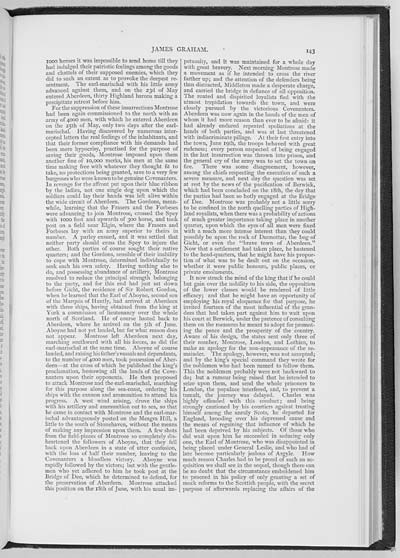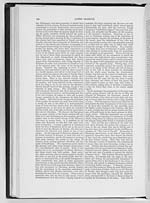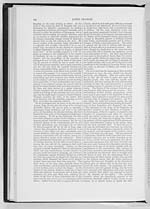143
1000 heroes it was impossible to send home till they
had indulged their patriotic feelings among the goods
and chattels of their supposed enemies, which they
did to such an extent as to provoke the deepest re-
sentment. The earl-marischal with his little army
advanced against them, and on the 23d of May
entered Aberdeen, thirty Highland barons making a
precipitate retreat before him.
For the suppression of these insurrections Montrose
had been again commissioned to the north with an
army of 4000 men, with which he entered Aberdeen
on the 25th of May, only two days after the earl-
marischal. Having discovered by numerous inter-
cepted letters the real feelings of the inhabitants, and
that their former compliance with his demands had
been mere hypocrisy, practised for the purpose of
saving their goods, Montrose imposed upon them
another fine of 10,000 merks, his men at the same
time making free with whatever they thought fit to
take, no protections being granted, save to a very few
burgesses who were known to be genuine Covenanters.
In revenge for the affront put upon their blue ribbon
by the ladies, not one single dog upon which the
soldiers could lay their hands was left alive within
the wide circuit of Aberdeen. The Gordons, mean-
while, learning that the Frasers and the Forbeses
were advancing to join Montrose, crossed the Spey
with 1000 foot and upwards of 300 horse, and took
post on a field near Elgin, where the Frasers and
Forbeses lay with an army superior to theirs in
number. A parley ensued, and it was settled that
neither party should cross the Spey to injure the
other. Both parties of course sought their native
quarters; and the Gordons, sensible of their inability
to cope with Montrose, determined individually to
seek each his own safety. Having nothing else to
do, and possessing abundance of artillery, Montrose
resolved to reduce the principal strength belonging
to the party, and for this end had just sat down
before Gicht, the residence of Sir Robert Gordon,
when he learned that the Earl of Aboyne, second son
of the Marquis of Huntly, had arrived at Aberdeen
with three ships, having obtained from the king at
York a commission of lieutenancy over the whole
north of Scotland. He of course hasted back to
Aberdeen, where he arrived on the 5th of June.
Aboyne had not yet landed, but for what reason does
not appear. Montrose left Aberdeen next day,
marching southward with all his forces, as did the
earl-marischal at the same time. Aboyne of course
landed, and raising his father's vassals and dependants,
to the number of 4000 men, took possession of Aber-
deen�at the cross of which he published the king's
proclamation, bestowing all the lands of the Cove-
nanters upon their opponents. He then proposed
to attack Montrose and the earl-marischal, marching
for this purpose along the sea-coast, ordering his
ships with the cannon and ammunition to attend his
progress. A west wind arising, drove the ships
with his artillery and ammunition out to sea, so that
he came in contact with Montrose and the earl-mar-
ischal advantageously posted on the Meagra Hill, a
little to the south of Stonehaven, without the means
of making any impression upon them. A few shots
from the field-pieces of Montrose so completely dis-
heartened the followers of Aboyne, that they fell
back upon Aberdeen in a state of utter confusion,
with the loss of half their number, leaving to the
Covenanters a bloodless victory. Aboyne was
rapidly followed by the victors; but with the gentle-
men who yet adhered to him he took post at the
Bridge of Dee, which he determined to defend, for
the preservation of Aberdeen. Montrose attacked
this position on the 18th of June, with his usual im-
petuosity, and it was maintained for a whole day
with great bravery. Next morning Montrose made
a movement as if he intended to cross the river
farther up; and the attention of the defenders being
thus distracted, Middleton made a desperate charge,
and carried the bridge in defiance of all opposition.
The routed and dispirited loyalists fled with the
utmost trepidation towards the town, and were
closely pursued by the victorious Covenanters.
Aberdeen was now again in the hands of the men of
whom it had more reason than ever to be afraid: it
had already endured repeated spoliations at the
hands of both parties, and was at last threatened
with indiscriminate pillage. At their first entry into
the town, June 19th, the troops behaved with great
rudeness; every person suspected of being engaged
in the last insurrection was thrown into prison, and
the general cry of the army was to set the town on
fire. There was some disagreement, however,
among the chiefs respecting the execution of such a
severe measure, and next day the question was set
at rest by the news of the pacification of Berwick,
which had been concluded on the 18th, the day that
the parties had been so hotly engaged at the Bridge
of Dee. Montrose was probably not a little sorry
to be confined in the north quelling parties of High-
land royalists, when there was a probability of actions
of much greater importance taking place in another
quarter, upon which the eyes of all men were fixed
with a much more intense interest than they could
possibly be upon the rock of Dunnottar, the bog of
Gicht, or even the "brave town of Aberdeen."
Now that a settlement had taken place, he hastened
to the head-quarters, that he might have his propor-
tion of what was to be dealt out on the occasion,
whether it were public honours, public places, or
private emoluments.
It now struck the mind of the king that if he could
but gain over the nobility to his side, the opposition
of the lower classes would be rendered of little
efficacy; and that he might have an opportunity of
employing his royal eloquence for that purpose, he
invited fourteen of the most influential of the gran-
dees that had taken part against him to wait upon
his court at Berwick, under the pretence of consulting
them on the measures he meant to adopt for promot-
ing the peace and the prosperity of the country.
Aware of his design, the states sent only three of
their number, Montrose, Loudon, and Lothian, to
make an apology for the non-appearance of the re-
mainder. The apology, however, was not accepted;
and by the king's special command they wrote for
the noblemen who had been named to follow them.
This the noblemen probably were not backward to
do; but a rumour being raised that he intended to
seize upon them, and send the whole prisoners to
London, the populace interfered, and, to prevent a
tumult, the journey was delayed. Charles was
highly offended with this conduct; and being
strongly cautioned by his courtiers against trusting
himself among the unruly Scots, he departed for
England, brooding over his depressed cause and
the means of regaining that influence of which he
had been deprived by his subjects. Of those who
did wait upon him he succeeded in seducing only
one, the Earl of Montrose, who was disappointed in
being placed under General Leslie, and who had of
late become particularly jealous of Argyle. How
much reason Charles had to be proud of such an ac-
quisition we shall see in the sequel, though there can
be no doubt that the circumstance emboldened him
to proceed in his policy of only granting a set of
mock reforms to the Scottish people, with the secret
purpose of afterwards replacing the affairs of the

![]() Universal Viewer |
Universal Viewer | ![]() Mirador |
Large image | Transcription
Mirador |
Large image | Transcription
![]()

